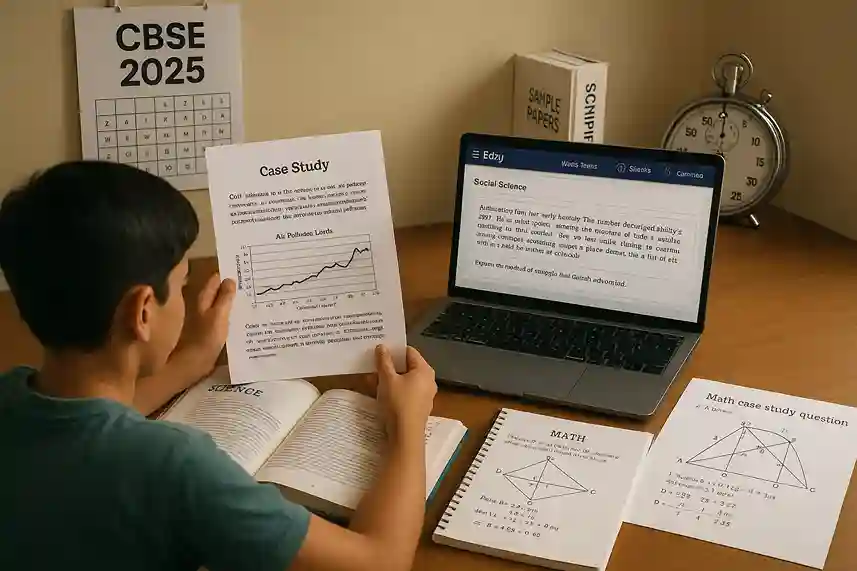Step-by-step strategies to excel in NCERT-based case study questions for CBSE 2025 exams
Case study questions are playing a bigger role in CBSE 2025 exams. This blog explains why they matter, how they are structured, subject-wise examples, key skills, practice tips, common mistakes to avoid, and exam strategies to master them.

Case study questions have become an integral part of CBSE exams, testing not just memorization but application and analysis of NCERT concepts. For students preparing for 2025, mastering this question type is no longer optional but essential. This blog provides a step-by-step guide with subject-specific examples, strategies, and expert tips to help students perform confidently.
Case study questions present a real-life scenario, passage, or data set, followed by questions that require analysis, interpretation, and logical application. Unlike direct questions, they test deeper understanding of concepts and encourage critical thinking. CBSE has included them across Science, Social Science, and Maths to prepare students for practical problem-solving.
The National Education Policy (NEP) 2020 emphasized competency-based learning. CBSE adopted case study questions to move beyond rote memorization, promoting skills such as reasoning, comprehension, and real-world application. They align with global education trends where exams focus more on problem-solving than fact-recall.
“Case study questions push students to think critically, bridging the gap between textbook knowledge and real-world applications.” — CBSE Academic Advisor
Typically, case study questions consist of a 100–150 word passage or data representation followed by 4–6 sub-questions. The questions are usually objective or short-answer based. The structure may include:
Comprehension of the provided text, graph, or chart
Identifying relevant NCERT concepts
Application of formulas, principles, or reasoning
Drawing conclusions supported by evidence
A case study may describe an environmental issue such as air pollution in Delhi, accompanied by a graph of pollutant levels. Questions can ask students to explain causes, suggest preventive measures, and link concepts to NCERT chapters on natural resources or pollution.
Students might be given an excerpt from a historical source about the Indian freedom struggle. They could be asked to interpret the source, identify perspectives, and connect it to NCERT chapters on nationalism.
A case study may present a practical scenario such as calculating the cost of constructing a park using coordinate geometry and mensuration. Questions would require applying formulas step by step to arrive at solutions.
To excel, students need to build specific skills:
Reading comprehension to quickly grasp passages and data
Critical thinking to identify the underlying NCERT concept
Application of knowledge instead of direct recall
Time management to handle lengthy questions within exam constraints
Regular practice is the best way to master case study questions. Students can:
Use NCERT exemplar problems that emphasize application
Attempt CBSE sample papers which now include case study sections
Practice mock tests on digital platforms like Edzy that offer gamified quizzes and real-time feedback
Form study groups to discuss multiple approaches to a case study
Students often lose marks not because they don’t know the answer but due to strategic errors:
Skipping the passage and directly attempting answers
Writing generic responses without linking to NCERT concepts
Spending too much time on one case study and rushing through others
Ignoring diagrams or data provided in the question
Students should allocate time smartly during exams. Begin by skimming the passage, underline key details, and answer objective questions first to secure quick marks. Then move to analytical questions, linking each answer clearly to textbook knowledge. Maintaining neatness, structured steps, and concise wording makes answers examiner-friendly. Practicing timed mock papers before exams ensures that students build both speed and accuracy.
With consistent practice, the right strategies, and expert-guided resources, students can master case study questions and secure top scores in CBSE 2025.

How to Prepare for the New CBSE Competency-Based Question Format
Mastering the new CBSE exam format for better academic performance

CBSE Question Paper Analysis: Trends You Must Know for 2025 Exams
Unlocking the secrets of CBSE question papers for smarter exam preparation

Top 10 Mistakes Students Make During Board Exam Preparation
Learn how to avoid common pitfalls in board exam preparation

CBSE Science Practical Exams: The Complete Student Guide
Master your CBSE Science practical exams with confidence and skill.